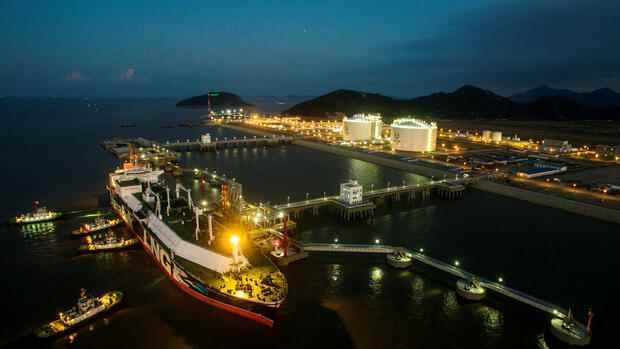In the short term, dependency can be reduced primarily through liquid gas, which would otherwise have been delivered to Asia.
(Photo: REUTERS)
Brussels It’s like fast-forwarding an energy transition: politicians no longer think in terms of decades when it comes to changing the supply. The EU has set itself the goal of reducing its demand for Russian gas by two-thirds – within just one year. “We must become independent of Russian oil, coal and gas,” said Commission President Ursula von der Leyen. “We simply cannot rely on a supplier who explicitly threatens us.”
But how is that supposed to work? The new strategy reads: The climate protection package, which aims to reduce the EU’s emissions by 55 percent by 2030, will be expanded. It is primarily about renewable energies and more efficiency, which can also reduce the consumption of fossil gas by 30 percent.
These efforts are now to be intensified in order to achieve savings of a good 45 percent. If that works, these measures alone would make it possible to almost completely do without Russian gas by 2030.
But there may not be that much time left. An energy embargo against Russia is discussed again and again. It would also be possible for Russia to stop supplying gas on its own. That is why the import of liquefied natural gas (LNG) is added.
Top jobs of the day
Find the best jobs now and
be notified by email.
The EU has already significantly increased its imports in the past two months and is still willing to pay high prices for LNG. “The EU reduced its dependency from 47 to 26 percent in January and February,” says Simone Tagliapietra from the Bruegel Institute in Brussels.
“We simply cannot rely on a supplier who explicitly threatens us.”
(Photo: Reuters)
Tagliapietra and other Bruegel scientists therefore believe that stopping gas imports from Russia could be cushioned without causing uncontrolled shortages. If no more gas comes through the pipelines from now on, the gas in the storage tanks would still be sufficient for the current heating period.
Coercive measures against the industry would be the last resort
Over the summer, the storage tanks would be filled with liquefied natural gas (LNG) as much as possible. Because of the LNG imports, the fill level in the gas storage facilities is currently rising despite the winter. It would be possible to store 500 terawatt hours (TWh) in Europe with LNG alone by next autumn.
>> Read here: “The longer we wait, the more time Putin has” – economics for quick energy embargo
However, that is only a third of what would be stored with the help of Russia. Without countermeasures, the storage would then run empty in the following January. Bruegel forecasts a gap of 400 TWh per month. The researchers estimate that coercive measures could reduce industry consumption by 170 TWh per month. But it would probably only be the last resort.
An obvious measure is the massive investment in solar power and heat pumps. However, this would only save 60 TWh. Coal-fired power plants that have been ramped up could make the largest contribution with 270 TWh. Gas turbines could also be operated with oil. In addition, there would be more economical behavior in households and companies.
The Greens miss sources of funding in the concept of the EU Commission. “Now we need a Marshall Plan for the energy transition and freedom in Europe by investing in solar roofs, wind turbines and heat pumps,” said MEP Michael Bloss. “But neither higher targets for the expansion of renewables nor for renovations or energy efficiency are included.”
Longer lifetimes of nuclear power plants are unlikely
Leaving nuclear power plants online longer would save 120 TWh of gas per month, according to Bruegel. However, the German Economics and Environment Ministries reject this. They explained that the low benefits are offset by high risks.
>> Read here: “The lights don’t go out here”: Researchers consider the Russian energy embargo to be manageable
In total, Bruegel compiled suggestions with potential savings of around 850 terawatt hours in the study published last week. They would therefore only have to be implemented halfway.
However, this does not mean that coercive measures against industry in Germany are ruled out. Because Germany is more dependent than other EU countries on gas from Russian pipelines.
Buying LNG only works to a limited extent because the pipeline network is not designed for it. The LNG terminal planned in Brunsbüttel will probably be operational in three years at the earliest. “There is little that can be done over the next 12 months to address physical bottlenecks,” the Bruegel analysis said.
More on this: Gas price breaks all records – call for a price cap
